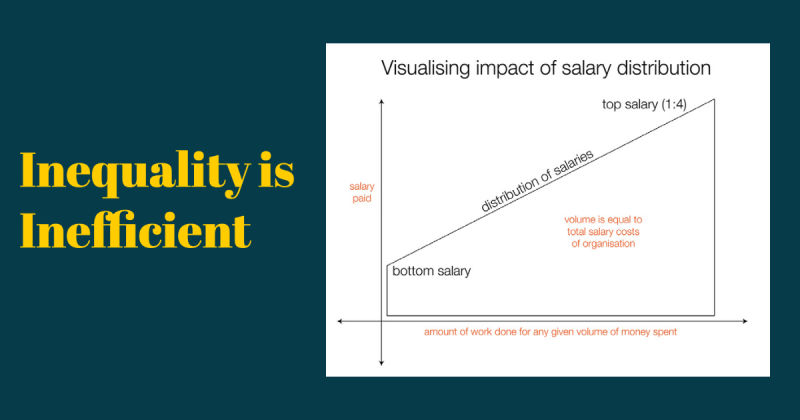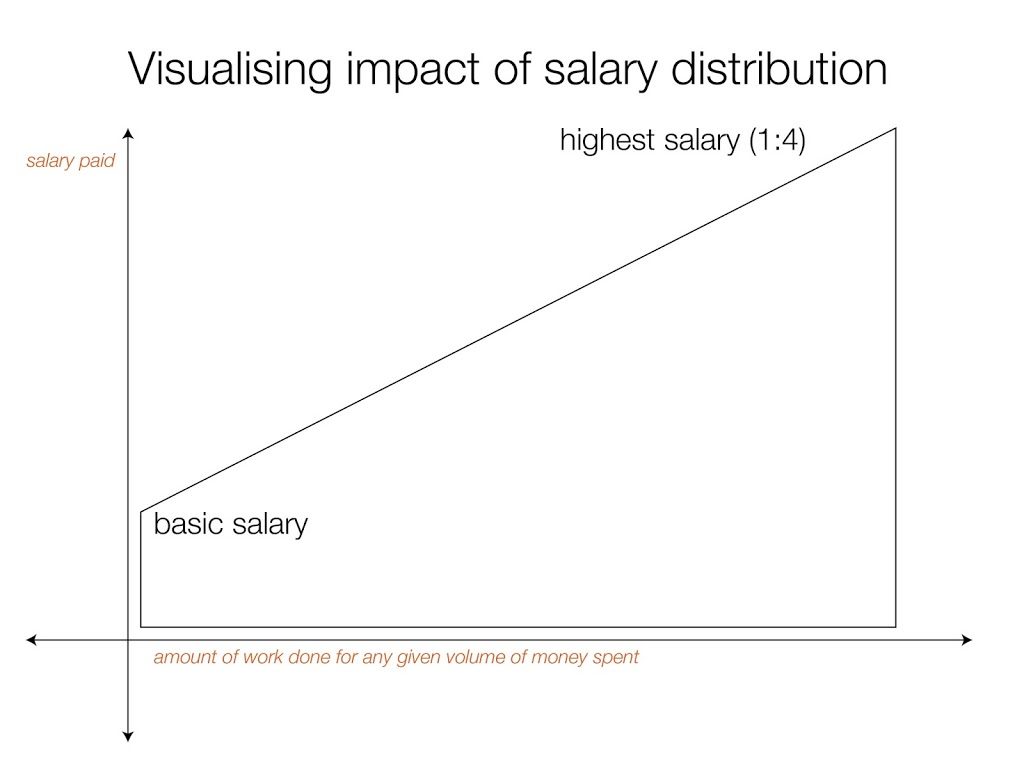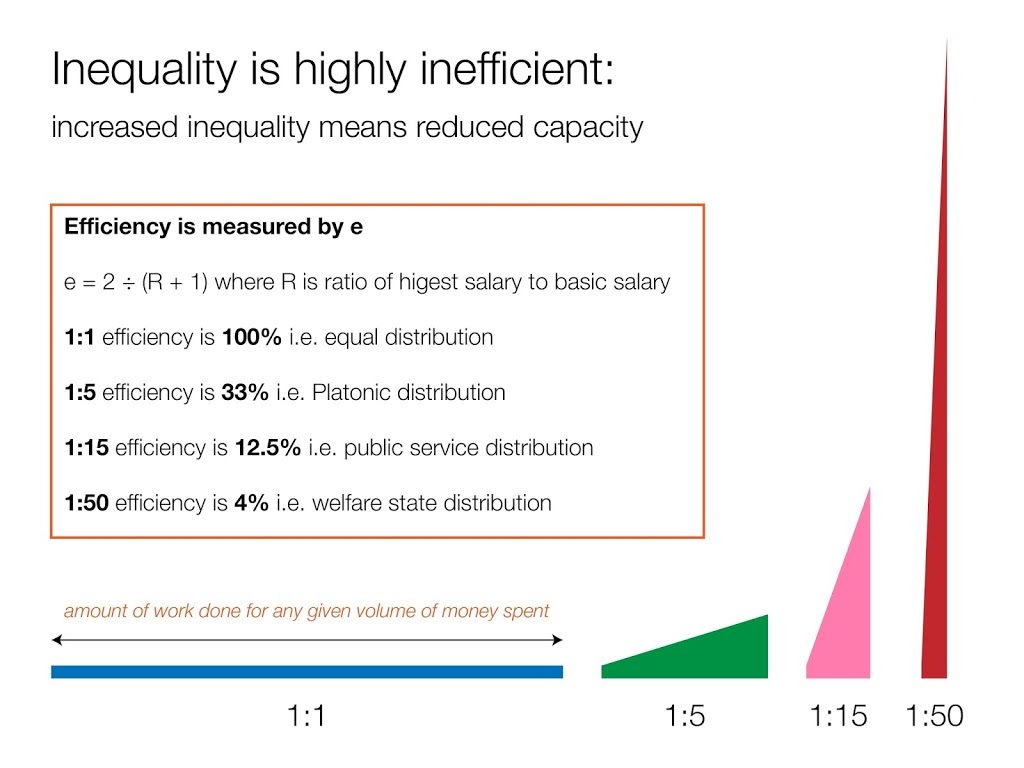2nd March 2017
Inequality is not only bad for us - bad for our mental health and bad for society - it is also really wasteful.

And the UK is an extreme case. It is now the most unequal country in Europe. A land that prided itself on its sense of fair play seems to have readily abandoned the notion of a fair distribution of resources. It would be fascinating, in a rather disturbing way, to explore why the UK has been so particularly negligent of equality.
Often the explanations offered for inequality are economic. However it is particularly important to recognise that inequality is political, not economic. It is a social and political choice to accept or encourage high levels of inequality. Society can choose to control inequality - if it wants to. However the political nature of inequality is often wilfully ignored and inequality is often presented as being merely a matter of economics, as if economics was some natural and uncontrollable force, quite distinct from human decision-making.
Inequality is neither inevitable nor necessary; but this truth has been perhaps obscured by a rather different debate. Often the debate about inequality is confused with the debate about the role of the state in the economy: the conflict between dirigisme and the free market.
Now it is certainly true that some advocates of equality do believe that it is only possible to create equality if the state takes absolute control of the economy. Opposing them are advocates of extreme economic liberty who argue that any economic control is bad, taxes are theft and that the inevitable inequality that arises from free economic activity is utterly justified. In fact both sides share the same false view that there is no way to reconcile equality and freedom; instead they both believe we are forced to choose: so the Left choose equality, while the Right choose freedom.
But this is crazy. We need both freedom and equality. Even in economic terms we need a significant degree of freedom and of equality simply in order to make our economic system work:
Even more importantly freedom and equality are not just economic variables. In life we need to be free, free to define a life of meaning for ourselves; and we also need to be an equal, valued as an equal member of the community. We reconcile freedom and equality by creating decent communities where we work together to create a better world for everyone.
One aspect of any decent community is that its members work hard to create the necessary conditions to achieve both freedom and equality. And, there are many ways to do this, ways that can combine a significant degree of economic freedom with a reasonable level of economic equality:
However interest in these disciplines is very low in the UK today. Redistribution is now treated with suspicion and excessive rewards for the rich are treated as the inevitable price to be paid for economic progress. There are many arguments of detail here and much evidence that can be provided to challenge the arguments for injustice and inequality. However I want to add just one argument, an argument from economics itself. I’m sure it’s an argument that someone else has made before, but I cannot remember seeing it, so I thought I’d try and outline it here.
Before I begin I’d like to distinguish my argument from two other important and valid arguments:
But the argument I want to offer is slightly different to these. I want to argue that inequality is also very inefficient.
At its simplest my argument is as follows. If I have a limited amount of money and I want to get the maximum amount of work done then paying people equally will maximise the amount of work that gets done. However, if I choose to pay some people much more than others then I will have to reduce the total amount of work I pay for.
This may seem obvious, but it’s perhaps worth underlining the point. Currently the false belief is that inequality is economically necessary - here I want to propose that inequality is inherently inefficient - in economic terms.
Imagine the distribution of salaries as a polygon. An equal distribution would be a rectangle, with salaries on the y axis and the volume of time purchased on the x axis. If some people have a higher salary then the polygon will be equivalent to a rectangle, with a right-handed triangle on top. Total spend is therefore equal to the volume of the shape.

Now if you assume that you have a fixed amount of money to pay for people’s time then the most efficient shape will be the rectangle. The more unequal the distribution then the higher the peak of the triangle and the shorter the width - in other words the less time you can buy.

In fact, if we make certain simplifying assumptions we can even calculate the level of inefficiency of increased inequality. If we describe the relationship between the base salary and the top salary as a ratio we find that efficiency is measured by the following formula:
e = 2 ÷ (R + 1) where R is ratio of base salary to highest salary
Now this exaggerates the size of the inefficiency. In practice the upward slope will be a long convex curves. Lots of people are on low salaries, fewer are on high salaries. However the basic truth remains, the higher the ratio the greater the level of waste.
Of course critics of equality will argue that we need inequality to buy the best. But this is a double fallacy. Of course, once you’ve allowed inequality to run amok, then you surely will have to spend more on some people to get them to work for you. But this is simply a side-effect of broken self-discipline: the Premier league may spend more to buy more of the better players - but it is not creating better football - it is merely skewing the distribution of better football away from one country and towards another. In other words inequality in incomes merely leads to inequality in skill distribution. This is not a good thing.
The second fallacy is that it assumes you have to pay people more to get them to do more complex or challenging work. This is clearly nonsense. Primarily people choose to do such work because it is intrinsically interesting, suits their talents and brings with it many other rewards. The things you should really have to pay people extra money to do are those things that are dirty, smelly and tiring (the things that in the real world people are paid less to do). If inequality has any real purpose it should be to compensate people for doing intrinsically unrewarding work.
The reality is that inequality suits those with the power to dictate the distribution. It is not the poor who set the salaries of the rich. Power - economic and political - is at the root of inequality. And power will be necessary to challenge and reverse it. The reason why inequality was low after World War II was that the poor had a lot of power and the rich knew it. Today the rich know the poor are weak and they exploit that fact.
Rebalancing things will take more than vapid debates about the state versus the market. It is not the market which is the real threat to equality, it is our low opinion of ourselves. If we choose to measure ourselves in terms of money then the state will not protect us, it will just adapt itself to our own low standards. We should instead choose to see ourselves as citizens who are worthy of equality - not because we are all worth the same money, but because money measures nothing of value. We should seek economic equality, not to pull anyone down, but to pull everyone up, to a higher level, to the status of an equal citizen.